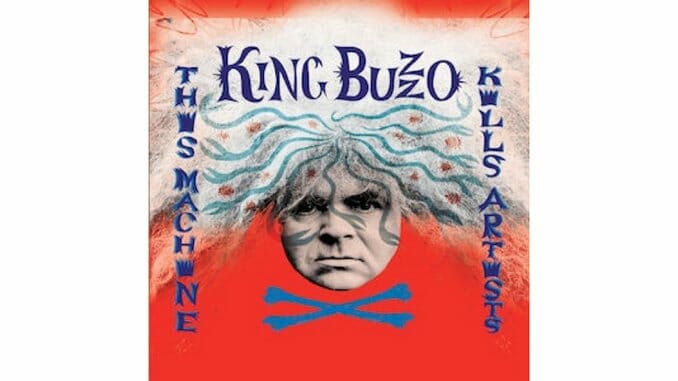
Sometimes the great ones just don’t know when to quit. Less often, the great ones quit too soon. Legendary grunge/skuzz progenitor Buzz Osborne?he of the mighty Melvins?just plain old shouldn’t quit doing anything but keep on keepin’ on. There’s no more proof needed than the release of his first solo LP, This Machine Kills Artists.
At a staggering 17 tracks, Osborne’s rough edges are tamed?barely?by the fact that the entirety of This Machine Kills Artists is performed on a Buck Owens American acoustic guitar, with zero electric accoutrements or amps. But before you write this approach off as the standard next step for an aging rocker?some tempered bluegrass revivalism or folkster wankathon?Osborne’s collection of chuggy riffs, down-tuned dirges and heavy ruminations hit just about as hard as his Melvins catalog.
The seamless nature of the transfer from electric to acoustic here stems, easily enough, from the fact that throughout Osborne’s songwriting career, he’s largely written those punishing sludge-rock anthems on acoustic anyway, then just switched them over to some juice. The depth of the songs on This Machine, then, represent a sort of behind-the-scenes look into the seminal phases of King Buzzo’s bizarre world.
Tongue-in-cheek though the title may be, the album’s press release even quotes Osborne as saying, “I have no interest in sounding like a crappy version of James Taylor or a half-assed version of Woody Guthrie.” Dispensing with those pleasantries right away, opening track “Dark Brown Teeth” forges a sinister drop-D warble, descending in an almost pretty, psychedelic journey until Buzzo unleashes the heavy. The next track, “Rough Democracy,” runs along similar lines, showing his mastery at redundancy-as-profundity.
Would these songs benefit from the hard-hitting backbone of Dale Crover, Coady Willis and Jared Warren? Of course; there are obvious pockets of the dynamic chemistry that makes the Melvins sound how they do that would exhume these acoustic skeletons a bit. But that’s not what we’re listening to.
As a logical next step for Osborne, this album is a debatable move. It’s also a daring one. Song-wise, it’s as damaging and heavy and dark as anything he’s put out prior, and sneakily supports the idea that Osborne is no one-trick pony.